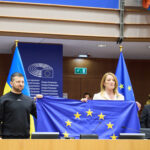Has the EU failed citizens over its response to the Corona pandemic?
Turbulent days in Brussels: Hectic manoeuvering and animated debates over the role of the EU and its responsibility for the sluggish vaccination campaign have marked the past weeks and show now signs of abating.
On 29 January, the European Commission seemed ready to invoke a clause in the Protocol on Northern Ireland recently agreed with the UK that would have amounted to an export ban of vaccines to Northern Ireland and thus the United Kingdom. After protests from a number of governments, the Commission backtracked quickly, but the episode left a sour aftertaste.
The von der Leyen Commission’s handling of the vaccine procurement first came under intense criticism when AstraZeneca announced plans to cut its delivery for the first quarter of 2021 by more than 50 percent. Other companies have since said that they also encounter production problems.
While the Commission had insisted its contract with the companies is watertight, critics say it is not – and it has been signed too late compared with other countries such as the United Kingdom.
Below, we take a closer look at the some of the questions and arrangements that this debate is about and at the arguments deployed in the debate.
Who has the competence for healthcare in the EU?
Healthcare is a national competence of member states. The EU can only act as a secondary actor where member states are lacking. The EU’s competences in this domain are laid down in Article 168 of the Treaty. The EU is allowed to intervene in order to public health in general and prevent illnesses. Specifically, this article gives the EU the competence to research the causes, transmission and prevention of great plagues. It can, for instance, educate and inform the public about a virus and take measures to guard its external borders from any viral menace.
However, Article 168 does not give the EU the right to act without a specific mandate by the member states. Rather, the EU’s formal role is to complete the actions by member states and encourage their cooperation. The European Parliament and the Council can legislate to improve health in major cross-border health scourges. However, the Union needs to respect competences of its member states, e.g. in the definition of health policy, the organisation and delivery of health care, the management of resources, etc.
In this context, the Commission made a proposal for recommendation 2020/0377 on 18 December 2020. In it, a common policy for rapid antigen tests is spelled out.
What role do member states play in determining the vaccine strategy and the contracts with producers?
The Commission has reiterated again and again that its powers have been delegated to it by member states. In June 2020, it was decided that the quest for the development and production of Covid-19 vaccines should be spearheaded by the Commission, to avoid a competition between member states and to bring to bear European market power.
Prior to that, four countries – France, Germany, Italy and the Netherlands – had set up the Inclusive Vaccine Alliance. Whilst the 27 health ministers signed off for the Commission to negotiate deals with pharmaceutical companies, the Alliance was at first negotiating directly and came to an early agreement with AstraZeneca in June 2020. It then folded its operations and gave power to the Commission, which put in place a negotiating team comprised of EU officials and the representatives of seven member states. Four of them represent the members of Inclusive Vaccine Alliance. Delegates from Spain, Portugal and Poland were added. Together, they form the Steering Board.
Could member states refuse to be part of the common vaccine strategy?
In June, Health Commissioner Stella Kyriakides proposed a common EU vaccination plan. It allowed for the Commission to repurpose the Emergency Support Instrument to take executive decisions.
A state is allowed to negotiate on its own with vaccine providers. However, any agreement resulting from talks with producers which whom the Commission itself entered into a contract cannot take priority, in other words, any national allocation has to wait until the Commission-negotiated allocation has been delivered.
First come, first serve?
Some observers argue that the EU signed months after other countries did so, and is therefore at a disadvantage compared with countries like the UK. While it is correct that the Commission entered its first advance-purchasing agreement only in August 2020 (with AstraZeneca), it is legally disputed that the fulfillment of contracts with countries who ordered earlier overrides that of the Commission.
The EU said it chose a more careful approach to ensure that liability questions were settled, the potential and the quality of vaccines under development could be properly assessed.
However, critics argue that the Commission failed to take into consideration that time was of the essence and that bargaining for a better deal was counterproductive. Instead, they say that the EU should have followed a Whatever-it -takes” approach, like Israel, to end the pandemic as quickly as possible.
Others argue that the amount invested by the EU in vaccine development and procurement was insufficient and contributed to a delay in the delivery of the doses.
A lengthy approval process?
The approval of new vaccines and other drugs is handled by the European Medicines Agency (EMA). A final approval is then made by the Commission.
So far, EMA has approved three vaccines: those developed by BioNTech/Pfizer (21 December 2020), Moderna (6 January 2021) and AstraZeneca (29 January 2021). Prior to that, all 27 EU member states agreed not to issue emergency approvals, to which they would be legally entitled, as it was felt that this could potentially undermine trust in the vaccination programme.
Did the EU order enough doses?
A total of 2.3 billion doses have so far been ordered by the European Commission from different producers through advanced purchase agreements. They are to be delivered in the course of 2021 and would be more than sufficient to vaccinate the entire European population
However, the number of doses distributed to member states in December 2020 and the first quarter of 2021 has been deemed insufficient, and some point to the fact that the EU did not invest enough in building the capacity for faster production. Some company representatives have, however, pointed out that it takes several months to increase capacity and that the production process of the vaccines was complex.
After several vaccine producers said they were having problems in delivering the ordered quantities for Q1 of 2021, the Commission stepped up pressure on them.
It said the contractual agreements were binding, and whilst teething problems were to be expected, the EU could not be treated differently than other countries by one and the same company when it came to honouring its commitments.
Some observers and member state governments, however, blamed the EU for not negotiating better contracts or by not putting enough pressure on the companies.
The Commission hit back by blaming the problems on the companies and by arguing that the negotiations had been done in close cooperation with the member states.
Moreover, distribution and administration of the vaccine is organised by the authorities in the member states. While the Commission bears some responsibility for the development and procurement of the doses, it does not have a say in the rollout of the vaccination programme.
Were the contracts precise enough?
AstraZeneca has claimed that the the advance purchase agreement (APA) does not oblige it to deliver a certain number of vaccines at a certain point in time once it has show its “best reasonable efforts” to do so. The Commission argues that “best reasonable efforts” was an objective term that could not be interpreted as allowing the company to avoid its liability in case of non-compliance whilst simultaneously honouring fully its commitments to other customers such as the UK.
The AstraZeneca contract with the EU defines best reasonable efforts as “the activities and degree of effort that a company of similar size with a similarly-sized infrastructure and similar resources […] would undertake or use in the development and manufacture of a Vaccine at the relevant stage of development or commercialization having regard to the urgent need for a Vaccine to end a global pandemic which is resulting in serious public health issues, restrictions on personal freedoms and economic impact, across the world but taking into account efficacy and safety”. This definition poses clear objective criteria of comparison to a reasonable basis.
Although legal remedies are available to the parties, the EU does not want to go down that road as it would take too long and would unlikely generate more doses being delivered in the short term.
Can agreements with other non-EU states override those of the EU?
An APA is a pre-contract signed to buy vaccines before they exist. It allows states, in this case the EU, to reserve doses in exchange for a significant amount of money.
However, as most agreements are not made public, it is difficult to verify how “watertight” the claims made by the EU are that its contract with AstraZeneca needs to be honoured.
The firm has four plants in Europe, two of them in the UK, one in Belgium and one in the Netherlands. The two latter are experiencing problems and are blamed for the reduction in the capacity AZ can deliver. However, under the agreement with the Commission, AZ identifies all four plants as being part of the vaccine production for the EU. The Commission argues that therefore, it has a right to be delivered from the UK plants as well, to make up for the shortfall. It also demanded AstraZeneca to hand over detailed explanations for the delay. The Commission is particularly angry at the fact that AZ seems to maintain its commitment with the UK fully whilst cutting back on deliveries to the EU.






